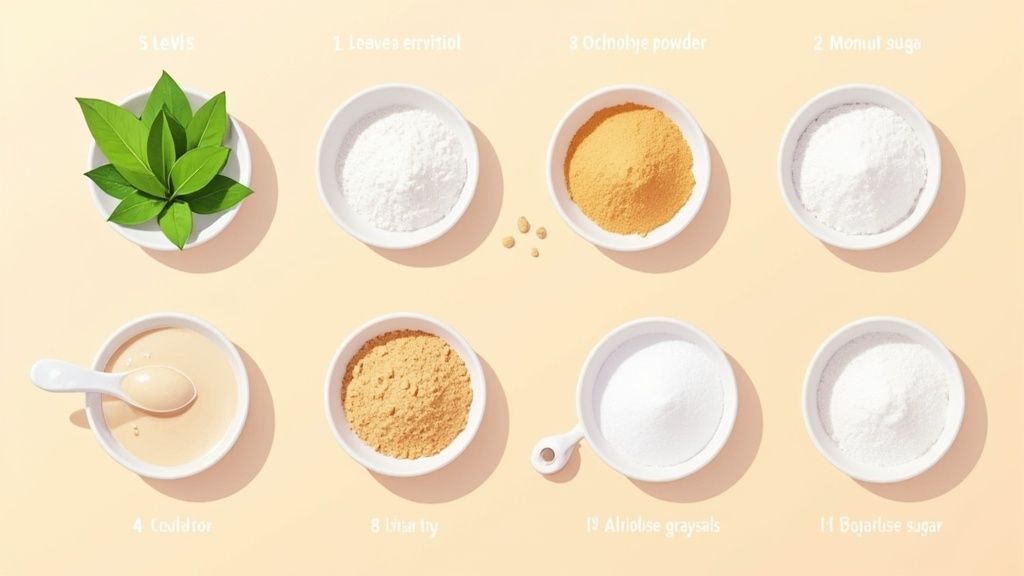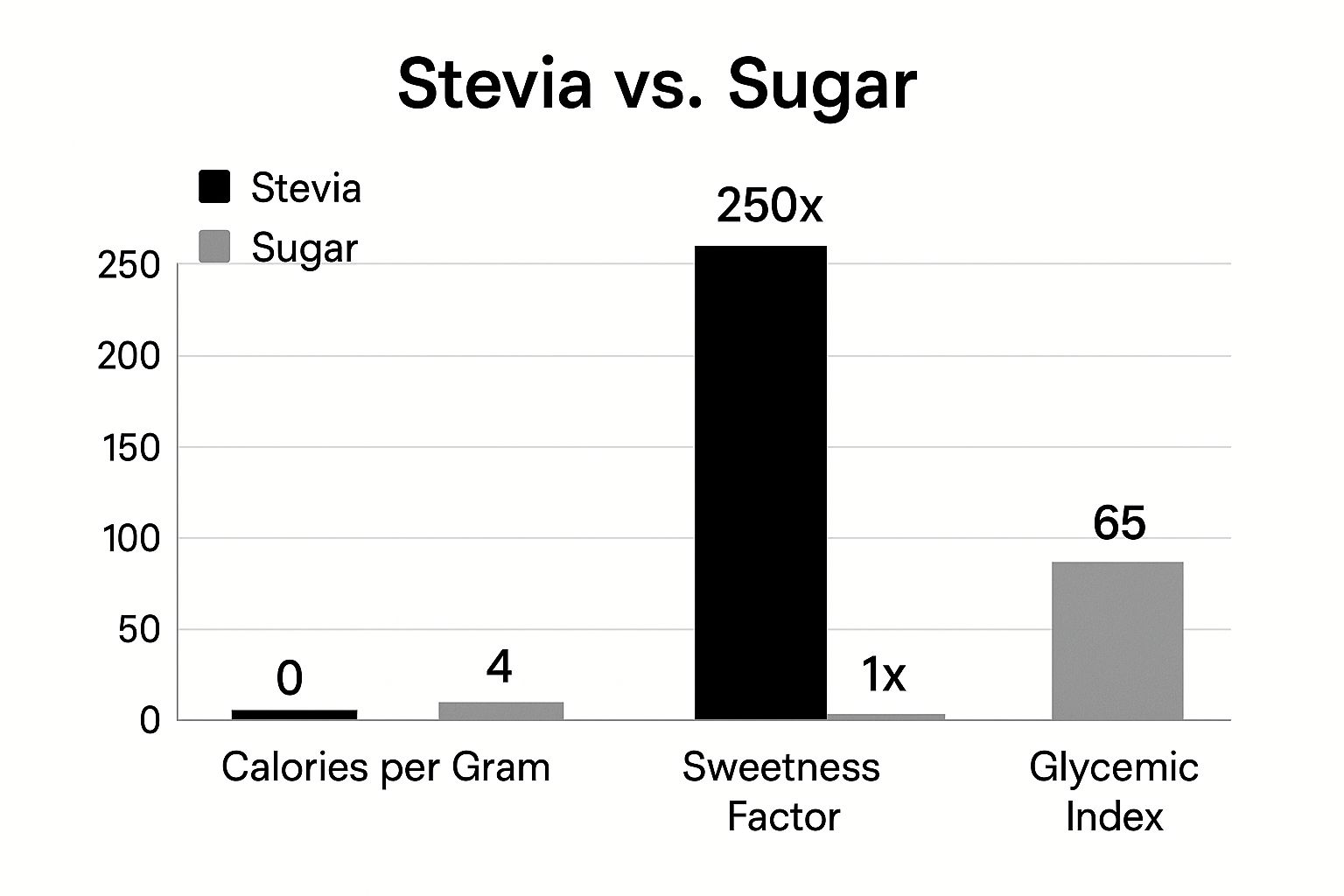8 Best Sugar Alternatives for Weight Loss in 2025

Trying to lose weight often feels like a constant battle against sugar cravings. The processed foods that line grocery store shelves are packed with added sugars, making it a difficult habit to kick while pursuing health goals. But what if you could satisfy your sweet tooth without derailing your progress? The solution lies in choosing the right sugar alternatives for weight loss. These substitutes provide the sweetness you enjoy, but without the excess calories and dramatic blood sugar spikes that can interfere with fat loss and energy levels.
This guide is your straightforward resource for making smarter sweet choices. We will dive into a detailed roundup of the top 8 sugar alternatives, breaking down exactly how each one works. You will learn the specific benefits, potential drawbacks, and practical ways to use them in your daily routine. From sweetening your morning coffee to baking healthier treats, this list provides the essential information needed to manage cravings effectively. Let’s explore the world of smart sweeteners and discover which options are the perfect fit for your lifestyle and weight management journey. This is your first step to cutting sugar without sacrificing sweetness.
1. Stevia
Stevia is a natural, zero-calorie sweetener extracted from the leaves of the Stevia rebaudiana plant, a shrub native to South America. It is one of the most popular sugar alternatives for weight loss because it provides intense sweetness without any calories or carbohydrates. This means it doesn't raise blood glucose or insulin levels, making it an excellent choice for managing weight and for individuals with diabetes.
The key to stevia's power lies in its compounds, called steviol glycosides, which can be 200-300 times sweeter than regular table sugar. Because it's so potent, you only need a tiny amount to achieve the desired sweetness.
Why Choose Stevia?
Stevia is ideal when you need a powerful sweetener for beverages like coffee and tea or in recipes where you want to drastically cut calories without sacrificing sweetness. It's heat-stable, so it works well in both cooking and baking.
- Zero Calories: Helps create a calorie deficit necessary for weight loss.
- No Blood Sugar Impact: Prevents the blood sugar spikes and crashes associated with sugar, which can lead to cravings and overeating.
- Natural Origin: Sourced from a plant, appealing to those who prefer less processed options.
The following bar chart visually breaks down the significant advantages stevia has over traditional sugar.

As the chart clearly illustrates, stevia provides zero calories and has no effect on the glycemic index, unlike sugar, which contains 4 calories per gram and has a high glycemic index of 65.
How to Use Stevia Effectively
Some people notice a slightly bitter or licorice-like aftertaste with stevia. To get the best results, start with a very small amount and adjust to your taste. You can find stevia in liquid, powder, and granulated forms. For best results, use liquid drops for drinks and powders for baking, but always check the product's conversion chart, as many blends (like Truvia) contain fillers that alter their volume.
2. Monk Fruit Sweetener
Monk fruit sweetener is a natural, zero-calorie sweetener extracted from the siraitia grosvenorii fruit, a small gourd native to southern China. As one of the most effective sugar alternatives for weight loss, it derives its intense sweetness from natural compounds called mogrosides. These antioxidants provide a sweet taste that is 150-250 times more potent than table sugar but without any of the calories, carbohydrates, or impact on blood sugar.

This makes monk fruit an outstanding choice for anyone aiming to reduce their calorie intake for weight management. Its lack of impact on glucose levels also makes it a safe and popular option for individuals managing diabetes or following low-carb diets like the keto diet. Popularized by brands like Lakanto, it is increasingly found in health food stores and premium keto-friendly products.
Why Choose Monk Fruit Sweetener?
Monk fruit is an excellent all-purpose sweetener, particularly for those who are sensitive to the aftertaste of other alternatives like stevia. It has a cleaner, more rounded sweetness that works well in everything from coffee and smoothies to sauces and baked goods. Its heat stability makes it a reliable sugar substitute for cooking.
- Zero Calories and Carbs: Directly supports weight loss by helping you cut sugar calories without giving up sweetness.
- No Glycemic Impact: Helps stabilize blood sugar, preventing the energy crashes and cravings that can derail a healthy eating plan.
- Natural and Antioxidant-Rich: The mogrosides that provide sweetness also have antioxidant properties, offering a small health bonus.
How to Use Monk Fruit Sweetener Effectively
Pure monk fruit extract is extremely potent, so it is often blended with other ingredients like erythritol to balance the sweetness and provide bulk, making it easier to measure for recipes. Always check the label; look for pure monk fruit extract or blends without added sugars or fillers like maltodextrin.
To avoid an overly sweet result, start with less than you think you need and add more to taste. Because it dissolves well, it is perfect for sweetening liquids. For best results in baking, choose a granulated monk fruit blend specifically formulated as a 1:1 sugar replacement to achieve the right texture and volume in your recipes.
3. Erythritol
Erythritol is a type of sugar alcohol found naturally in some fruits, like pears and grapes, and fermented foods. It has become one of the most popular sugar alternatives for weight loss because it closely mimics the taste and texture of sugar. It contains only 0.2 calories per gram and provides about 70% of the sweetness, making it a nearly calorie-free swap.
The body doesn't fully metabolize erythritol. Instead, most of it is absorbed into the bloodstream and then excreted in urine, so it has a minimal impact on blood sugar and insulin levels. This quality makes it a great option for weight management and for those managing blood sugar. To learn more about how sugar alcohols work, you can explore other sugar alternatives for diabetics that share similar benefits.
Why Choose Erythritol?
Erythritol is an excellent choice when you want a sweetener that measures and bakes almost identically to sugar. It is often used in low-carb and keto recipes, from cookies to ice cream (like Halo Top), because it provides bulk and a familiar mouthfeel without the calories.
- Extremely Low Calorie: With virtually no calories, it helps reduce overall energy intake for weight loss.
- Minimal Blood Sugar Impact: Its low glycemic index prevents energy spikes and subsequent crashes.
- Better Digestive Tolerance: Compared to other sugar alcohols like xylitol or sorbitol, erythritol is less likely to cause digestive upset in most people.
How to Use Erythritol Effectively
Erythritol can sometimes have a cooling or minty aftertaste, especially when used in large amounts. It also doesn't dissolve as well in cold liquids as sugar does. To use it effectively, dissolve it in a warm liquid before adding it to cold drinks or recipes.
Many popular sweeteners, such as Swerve, are erythritol-based blends, often mixed with other sweeteners to improve taste and performance. When trying erythritol for the first time, start with a smaller amount to see how your body responds. It is available in granulated and powdered forms, making it a versatile substitute in your kitchen.
4. Xylitol
Xylitol is a sugar alcohol naturally found in many fruits and vegetables, like berries and corn. It offers a taste and texture remarkably similar to table sugar but with significantly fewer calories, making it a powerful tool among sugar alternatives for weight loss. Xylitol contains about 40% fewer calories than sugar and has a very low glycemic index, meaning it causes only a minimal rise in blood sugar and insulin levels.
Its one-to-one sweetness ratio with sugar makes it an easy substitute in recipes without complex conversions. Beyond weight management, xylitol is widely celebrated for its dental health benefits, as it helps prevent the bacteria that cause cavities. This unique combination of properties has made it a popular ingredient in sugar-free gums, mints, and even some Scandinavian dental health programs.
Why Choose Xylitol?
Xylitol is perfect for those who want a sugar substitute that behaves almost identically to sugar in recipes, especially in baking and cooking. Its clean, sweet taste lacks the aftertaste associated with some other sweeteners, making it a versatile choice for everything from your morning coffee to homemade desserts.
- Low Calorie: Contains only 2.4 calories per gram, helping to reduce overall calorie intake.
- Minimal Blood Sugar Impact: Its low glycemic index helps stabilize energy levels and control cravings. Learn more about managing sugar cravings with alternatives.
- Tastes Like Sugar: Provides a satisfying sweetness without a noticeable aftertaste, making it easy to adopt.
How to Use Xylitol Effectively
The main consideration with xylitol is that it can cause digestive upset in some people if consumed in large amounts. To avoid this, introduce it into your diet gradually. Start with one or two teaspoons per day and slowly increase your intake as your body adjusts. Brands like XyloSweet are readily available for home use.
Crucially, xylitol is extremely toxic to dogs, so it must be kept safely away from pets. It works well in baking, but it does not caramelize or feed yeast, so it’s not ideal for making hard candies or traditional yeast breads.
5. Allulose
Allulose is a rare sugar found naturally in small amounts in foods like figs, raisins, and wheat. It is gaining traction as a superior sugar alternative for weight loss because it has the taste and texture of sugar but with almost none of the calories. It provides only 0.2-0.4 calories per gram, which is about 90% less than regular sugar.
What makes allulose unique is its chemical structure. Although it’s a monosaccharide just like fructose, the human body doesn't metabolize it. Instead, it passes through the body without significantly raising blood glucose or insulin levels, making it a safe and effective option for weight management and blood sugar control.
Why Choose Allulose?
Allulose is an excellent choice when you need a sweetener that behaves like real sugar in cooking and baking. It browns, caramelizes, and provides bulk and a mouthfeel that many other alternatives lack, making it perfect for creating soft-baked cookies, moist cakes, and even caramel sauce.
- Extremely Low in Calories: Helps you maintain a calorie deficit while enjoying sweet treats.
- Minimal Blood Sugar Impact: Prevents energy spikes and crashes, helping to control appetite and cravings.
- Behaves Like Sugar: Ideal for recipes where texture and browning are important.
Brands like Quest Nutrition and RxSugar have popularized allulose by using it in their keto-friendly products, showcasing its versatility. Its ability to create authentic-tasting sweets without the sugar load makes it a game-changer.
How to Use Allulose Effectively
Allulose is about 70% as sweet as sugar. To substitute it in a recipe, you’ll need to use a bit more; a common conversion is to use 1⅓ cups of allulose for every 1 cup of sugar. It dissolves well and doesn't have the cooling effect or aftertaste associated with some sugar alcohols.
When baking, allulose browns faster than sugar, so you may need to lower your oven temperature slightly. It also works well when blended with more potent sweeteners like monk fruit or stevia to achieve the perfect level of sweetness. For more tips on incorporating it into your recipes, explore these healthy sugar alternatives for baking.
6. Yacon Syrup
Yacon syrup is a natural sweetener extracted from the roots of the yacon plant, which is native to the Andes mountains in South America. Unlike other sweeteners, it stands out as one of the best sugar alternatives for weight loss due to its unique composition. It contains about half the calories of sugar and is rich in fructooligosaccharides (FOS), a type of soluble fiber that acts as a prebiotic, feeding the good bacteria in your gut.

The FOS in yacon syrup largely passes through the digestive tract undigested, which is why its calorie count is so low. This process also contributes to feelings of fullness and can aid in weight management, as shown in some studies. It has a sweet taste similar to molasses or caramelized sugar, making it a functional food as well as a sweetener.
Why Choose Yacon Syrup?
Yacon syrup is an excellent choice if you're looking for a sweetener that not only cuts calories but also supports digestive health. Its prebiotic properties can improve gut flora, which is increasingly linked to overall wellness and weight regulation. It gained popularity after being featured on shows like Dr. Oz for its weight loss potential.
- Low Calorie: Contains roughly 15 calories per teaspoon, significantly less than sugar.
- Promotes Gut Health: The high FOS content acts as a prebiotic, nourishing beneficial gut bacteria.
- May Increase Satiety: The soluble fiber can help you feel fuller for longer, reducing overall calorie intake.
How to Use Yacon Syrup Effectively
Because of its high FOS content, it's best to introduce yacon syrup into your diet gradually to avoid potential digestive discomfort like gas or bloating. Start with one teaspoon per day to assess your tolerance. Its rich, caramel-like flavor works well when drizzled over yogurt, oatmeal, or pancakes, or when mixed into smoothies and dressings.
However, yacon syrup is not suitable for high-heat cooking or baking, as temperatures above 248°F (120°C) can break down the beneficial FOS. To preserve its health benefits, use it exclusively in raw or low-heat applications. Always store it in a cool, dark place after opening to maintain its quality.
7. Aspartame
Aspartame is an artificial, low-calorie sweetener that has been a staple in diet products for decades. It is made from two amino acids: aspartic acid and phenylalanine. Its intense sweetness, roughly 200 times that of table sugar, makes it one of the most common sugar alternatives for weight loss found in products like Diet Coke and sugar-free chewing gum.
Because it is so potent, only a miniscule amount is needed to sweeten foods and beverages, contributing virtually no calories. Despite long-standing controversy, major regulatory bodies like the FDA have deemed it safe for the general population. Aspartame's effectiveness in reducing calorie intake has made it a popular choice for weight management.
Why Choose Aspartame?
Aspartame is best suited for cold applications, such as sweetening beverages or no-bake desserts. Its ability to provide a clean, sugar-like taste without the calories makes it a go-to for many popular "diet" and "light" products. It’s a reliable tool for cutting down on sugar without giving up sweetness.
- Extremely Low in Calories: Helps reduce overall calorie consumption, which is essential for weight loss.
- No Impact on Blood Sugar: Does not raise blood glucose or insulin levels, making it suitable for people with diabetes.
- Widely Available: Found in thousands of products, from diet sodas and yogurts to tabletop sweeteners like Equal.
How to Use Aspartame Effectively
The biggest limitation of aspartame is that it loses its sweetness when exposed to high heat, making it unsuitable for baking or cooking. It is also important to note that individuals with the rare genetic disorder phenylketonuria (PKU) must avoid it completely.
To use it effectively, add it to cold or room-temperature items like iced tea, smoothies, or yogurt. Since it is so concentrated, always start with a very small amount and adjust to your preference. Store aspartame-based products and sweeteners in a cool, dry place to maintain their stability and sweetness over time.
8. Sucralose
Sucralose is a widely used artificial, zero-calorie sweetener best known by the brand name Splenda. It is created from regular sugar through a chemical process that replaces three hydrogen-oxygen groups on the sugar molecule with chlorine atoms. This modification makes it indigestible by the body, so it passes through without being broken down for energy. This makes it a popular sugar alternatives for weight loss as it contributes no calories or carbohydrates.
The key to sucralose's appeal is its intense sweetness, which is approximately 600 times that of table sugar. Unlike many other sweeteners, it has a clean, sugar-like taste with minimal aftertaste, making it a versatile substitute in a wide range of products, from diet sodas and protein powders to sugar-free desserts.
Why Choose Sucralose?
Sucralose is an excellent choice when you need a reliable, heat-stable sweetener for cooking and baking. Because its taste profile is so similar to sugar and it holds up well under high temperatures, it's a favorite for creating low-calorie versions of baked goods, sauces, and other cooked dishes.
- Zero Calories: Directly supports a calorie-controlled diet essential for weight management.
- Highly Versatile: Its stability in both hot and cold applications makes it suitable for almost any recipe.
- Sugar-Like Taste: Preferred by many for its lack of the bitter aftertaste found in some other sweeteners.
The following bar chart visually breaks down the significant advantages sucralose has over traditional sugar.
As the chart clearly illustrates, sucralose provides zero calories and has no effect on the glycemic index, unlike sugar, which contains 4 calories per gram and has a high glycemic index of 65.
How to Use Sucralose Effectively
Granulated sucralose products like Splenda are designed for easy 1:1 replacement with sugar by volume in recipes, though they contain bulking agents like maltodextrin. For baking, using a blend that contains some real sugar (like Splenda Sugar Blend) can yield better results in texture and browning. Always start with a little less than the recipe calls for and adjust to your preference, as its intense sweetness can be overpowering if overused.
Sugar Alternatives: Key Attributes Comparison
| Sweetener | Implementation Complexity 🔄 | Resource Requirements ⚡ | Expected Outcomes 📊 | Ideal Use Cases 💡 | Key Advantages ⭐ |
|---|---|---|---|---|---|
| Stevia | Moderate: requires dosage control | Moderate: natural plant source | Zero calories, no blood sugar impact | Beverages, baking (adjusting for texture) | Zero calories, heat stable, suitable for diabetics |
| Monk Fruit Sweetener | Moderate: often blended with others | Moderate: less widely available | Zero calories, antioxidant benefits | Keto/low-carb, beverages, baking | Natural antioxidants, no bitter aftertaste |
| Erythritol | Low: 1:1 sugar replacement ratio | Moderate: sugar alcohol production | Very low calories (0.2 cal/g), no glycemic impact | Baking, cold drinks, keto desserts | Similar taste/texture to sugar, tooth-friendly |
| Xylitol | Low: 1:1 sugar replacement ratio | Moderate: sugar alcohol source | 40% fewer calories, dental health benefits | Baking, chewing gum, diabetics | Sugar-like taste, promotes dental health |
| Allulose | Moderate: substitution ratio varies | Moderate: rare sugar extraction | Low calories (0.2-0.4 cal/g), functions like sugar | Baking needing caramelization, keto recipes | Browns/caramilizes like sugar, minimal glycemic effect |
| Yacon Syrup | Moderate: thick consistency | Moderate: root extraction | ~2 cal/g, prebiotic fiber, digestive support | Smoothies, yogurt, appetite control | Prebiotic benefits, antioxidant content |
| Aspartame | Low: highly concentrated, no heat use | Low: synthetic production | Zero calories, no blood sugar impact | Cold drinks, room temp foods | Widely studied, familiar taste, cost-effective |
| Sucralose | Low: heat stable, direct sugar swap | Low: synthetic production | Zero calories, very high sweetness (600x) | Baking, cooking, beverages | Heat stable, close taste to sugar, long shelf life |
Making the Sweet Switch: Your Next Steps to a Lower-Sugar Life
Navigating the world of sugar alternatives for weight loss can feel overwhelming, but as we've explored, you have a powerful toolkit at your disposal. From the plant-based purity of stevia and monk fruit to the versatile functionality of sugar alcohols like erythritol and allulose, there is a solution for nearly every taste, recipe, and dietary need. The journey to a lower-sugar life isn't about finding a single, perfect replacement; it's about building a flexible approach that works for you.
Your path forward is one of mindful experimentation. The best sweetener for your morning coffee might not be the best for your weekend baking projects. Remember, the ultimate goal is sustainable change, not drastic restriction. By making smart swaps, you directly reduce your daily calorie and sugar intake, which is a cornerstone of effective weight management.
Key Takeaways for Lasting Success
To solidify your new habits, focus on these core principles:
- Personalization is Paramount: Your taste buds and digestive system are unique. What works wonderfully for one person might not be your favorite. Don't be discouraged if the first alternative you try isn't a perfect match.
- Start Small, Listen to Your Body: When trying a new sweetener, especially sugar alcohols like xylitol or erythritol, introduce it gradually. This gives your body time to adjust and helps you identify your personal tolerance level.
- Read the Labels: Many "sugar-free" products use a blend of sweeteners. Always check the ingredient list to know exactly what you're consuming, especially if you have sensitivities.
Your Action Plan for a Lower-Sugar Future
Ready to turn knowledge into action? Here are your next steps:
- Pick Your First Experiment: Choose one sweetener from our list that intrigued you the most. Maybe it's allulose for its caramelizing ability or yacon syrup for its prebiotic benefits. Purchase a small amount to try.
- Integrate It Simply: Start by adding your chosen alternative to something you have every day, like your tea, coffee, or oatmeal. This makes it easy to assess the taste and how you feel afterward.
- Track Your Progress: Keep a simple journal for a week. Note which sugar alternatives for weight loss you used, how you used them, and any changes you notice in your energy levels or cravings. This data will empower you to make better choices.
As you embrace a lower-sugar lifestyle, understanding your individual energy needs becomes crucial for optimizing your results. A great way to personalize your nutrition is to calculate your Basal Metabolic Rate (BMR) to better understand the calories your body burns at rest.
Reducing sugar is a significant step toward reclaiming your health, stabilizing your energy, and achieving your weight loss goals. This isn't about deprivation; it's about empowerment. You are now equipped with the knowledge to satisfy your sweet tooth intelligently, breaking free from the blood sugar rollercoaster and building a healthier, more vibrant life. The sweet life is still possible, just with smarter ingredients.